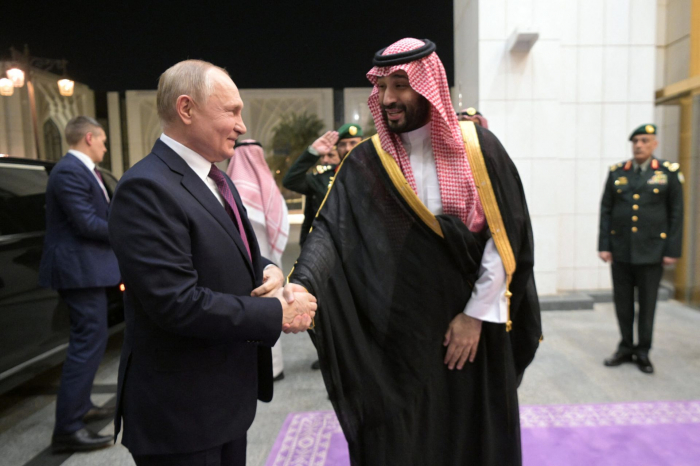Moscow will be starved of funds to run its war economy if Saudi Arabia delivers on plans to hike crude production to protect its own position as global oil kingpin, Politico reported.
Riyadh is increasingly frustrated with other petrostates' failure to coordinate on cutting supply to raise oil prices to about $100 per barrel — up from the current $70. Oil traders say Saudi Arabia is now set to respond by flexing its muscles and turning the tables on smaller producers, exporting more oil itself to grab market share and profits, even as prices fall.
That strategy could sink oil prices and spell bad news for Russian President Vladimir Putin. Oil and gas have been the largest single source of revenue for the Russian state over the past decade, making up as much as half of the country's budget.
Mikhail Krutikhin, a Russian energy analyst based in Norway, said Saudi Arabia's possible move posed "an enormous risk" for Moscow's state budget, because of its overwhelming dependency on oil revenues. And it's just one of several unpredictable factors on the horizon, including the U.S. presidential election.
"So we have to sit back now and wait — stock up on the popcorn," he said.
Saudi Arabia "understands perfectly well that Russian companies do not comply with the demand to reduce production, so they are making their own plans," Krutikhin added.
Alexandra Prokopenko, an economist and fellow with the Carnegie Endowment for International Peace, agreed the stakes were high for the Kremlin.
"At current exchange rates, a $20 fall in oil prices would lead to a 1.8 trillion ruble ($20 billion) fall in revenues. That’s equivalent to about 1 percent of Russia’s GDP," she said.
"The government would face a choice of either reducing spending — unlikely during a war," Prokopenko added, “or accepting inflationary pressure and stiflingly high interest rates."
The Financial Times reported last week that Saudi Arabia could abandon its long-held ambitions to limit the crude supply to push prices to around $100 a barrel.
Oil market experts have little doubt that Saudi Arabia has the enormous production and export capacity to change tactics and gun for market domination through volume instead.
"The global economy is fairly sluggish and oil demand is not as high as the Saudis would want," said Ajay Parmar, director of oil markets analytics at commodities intelligence firm ICIS. "Some producers, including Russia, are consistently exceeding their quotas, so that means prices are nowhere near $100 per barrel and the Saudis are losing patience. This would be one way for the Saudis to fire a warning shot to the market that they will act."
Oil market experts have little doubt that Saudi Arabia has the enormous production and export capacity to change tactics and gun for market domination through volume instead. | Fayez Nureldine/AFP via Getty Images
"The message is: 'You guys need to buck up or you will all be earning less overall because we will go for market share over high price,' and if there's one country in the world that has the capacity to do that, it's Saudi Arabia," Parmar added.
Russia, along with countries like Kazakhstan and Iraq, has been accused of shipping more oil than agreed to with the OPEC+ cartel, a collection of oil-producing states working to control global supply and price. Moscow has consistently exceeded its voluntary quota, which currently stands at 8.98 million barrels a day, despite vowing time and time again to bring production in line with the target.
Russia's fossil fuel profits have also risen by 41 percent in the first half of this year alone, according to Moscow's finance ministry, despite Western sanctions imposed over the war in Ukraine.
President Vladimir Putin has vowed to continue pumping fossil fuels to prop up his country's beleaguered economy. "Everyone has difficulties and we have our own," he admitted at an energy forum speech last week, "but Russia continues to be one of the leading participants in the global energy market."
On top of that, Russian state newswire TASS reported on Thursday that the country was contemplating a new strategy to maintain oil production at 540 million tons per year until 2050 — in open defiance of efforts to draw down extraction to help combat climate change.
Russia has cultivated a "shadow fleet" of aging vessels to ship its crude in violation of a $60 per barrel price cap imposed by G7 countries, and circumvention of the restrictions has netted the Kremlin almost $25 billion since the start of the full-scale invasion.
A loophole allows middlemen in countries like Turkey, China and India to refine Russian oil in petrol and diesel before selling it elsewhere — exempt from sanctions. According to a report first seen by POLITICO, Western countries spent $2 billion on this rebranded fuel in the first half of 2024, netting the Russian state enough tax revenue to recruit an additional 6,200 soldiers a month to fight in Ukraine.
Still, even if Saudi Arabia makes its move, a cash-strapped Kremlin isn't likely to back down in its war against Ukraine — despite setting its national budget on the expectation that its crude will sell for around $70 per barrel, more than most are willing to pay.
“Signs of imbalances in the economy are increasing," said Heli Simola, a researcher at the Bank of Finland, but "Russia will still be able to continue financing the war for some time. The war won’t end because Russia is running out of money.”
More about:
















































